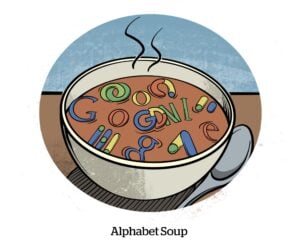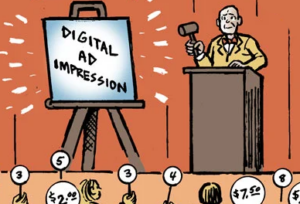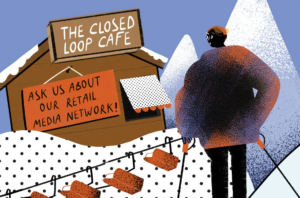If Judge Leonie Brinkema, who’s presiding over Google’s ad tech antitrust trial in Virginia, had a catchphrase, it would probably be “Let’s move this along.”
Since the trial began on September 9, thousands of documents have been entered into evidence, and Judge Brinkema has listened to roughly 80 hours of testimony.
Now that the DOJ has rested its case and it’s time for Google to present its defense, the judge has issued clear instructions for both sides to speed it up. There’s a reason people call the US District Court for the Eastern District of Virginia the “rocket docket.”
But while the arguments are starting to get a little repetitive, the trial has been a source of fascinating revelations, a mix of witness testimony and nuggets unearthed from internal email conversations between current and former Google employees.
A lot has already been said and cited, with more to come. Here are a few of the most notable quotables from the first two weeks of the trial.
‘Vehemently opposed’
During Brian O’Kelley’s video deposition, it came out that Prebid.org exists today because Google pressured the IAB Tech Lab not to take over the code.
The IAB Tech Lab would have been a logical home for Prebid, but Google was no fan of header bidding – and Google was the IAB’s largest financial contributor at the time. Google is also an IAB board member.
At one board meeting, it was proposed that the Tech Lab host the Prebid code. But Google was “vehemently opposed,” and so it didn’t happen.
‘Emotional and unproductive’
Today, Stephanie Layser is the global head of publisher ad tech solutions at AWS. But in 2019, she was VP of ad tech at News Corp – and she was more than a little frustrated with certain changes to Google’s auction model.
Changes such as the rollout of unified pricing rules, which eliminated a publisher’s ability to set variable floor prices. This loss of control might have been the last straw – if Layser hadn’t felt so locked into Google’s sell-side ad tech.
Layser wrote an email to Google asking to meet about her concerns. At that meeting, which was with two female Google employees, Layser was told she was being “emotional and unproductive,” she told the court.
‘Irrationally high rent’
It’s been established during the trial that Google charges a 20% take rate for its ad exchange. Most other exchanges charge somewhere in the 10% range.
Is Google’s 20% cut worth it? Not on its own, according to Google’s own executives. Google Ads demand is the sweetener that keeps publishers from leaving.
The government cited a series of emails and messages made to that effect over the years by Chris LaSala, Google’s former global product and strategy lead for sell-side ad products.
For example, in a comment on an undated document about potentially changing the fee structure (which never happened), LaSala referred to the AdX sell-side margin as an “irrationally high rent.”
“One might ask why the market continues to bear 20%,” LaSala wrote. “It may be because of adwords bringing liquidity from a long-tail.”
The expert witness
According to the DOJ, the connection between AdX and Google Ads is an example of illegal tying.
To support its argument, the government referred to research by Robin Lee, a professor of economics at Harvard University and an expert in platform competition and two-sided markets.
Based on Dr. Lee’s calculations, if AdX no longer had access to Google Ads demand, publisher revenue would drop by 27.9%. By comparison, no other exchange would see revenue decrease by any more than 0.5%. (h/t to Ari Paparo)
Dr. Lee also testified that Google has a monopoly over the ad server market because it was possible to release very unpopular features – such as unified pricing rules – without any fallout. Publishers may have complained, but they didn’t feel able to leave.
Because changing ad servers is apparently one of the circles of hell that Dante forgot to mention.
In 2008/2009, shortly after Google’s DoubleClick acquisition, David Rosenblatt, CEO of DoubleClick, described the experience of changing ad servers like so: “Takes an act of God to do it.”
Which is why “nothing really matters but the platform,” Rosenblatt observed at the time. “Nothing has such high switching costs. If there’s a better network or exchange, you can just switch to it. Switching platforms is a nightmare.”
‘Parking it somewhere’
But although the platform was and is all important, other forms of competition crop up and need to be addressed.
Before real-time bidding came to be around 2009, companies like PubMatic, Rubicon and Admeld were gaining share by helping publishers optimize their spend in the waterfall. Google saw this as a threat and acquired one of these companies – Admeld – in 2011.
Did Google buy it just to shut it down, though?
Yes, according to the DOJ, which pointed to a 2010 email in which Neal Mohan, now the CEO of YouTube, back then the man in charge of Google’s display business, wrote: “One way to make sure we don’t get further behind in the market is picking up the [company] with the most traction and parking it somewhere.”
Mohan explained that he meant Google planned to keep the company running while integrating it into the rebuild of its own stack. But “parking it somewhere” is a tricky phrase.
Google shut down Admeld in 2013, two years after buying it.
 ‘The problem is that HB exists :)’
‘The problem is that HB exists :)’
Fast-forward to 2018, and Google executives were getting concerned about the rise of header bidding, including that Google’s own DSP was bidding into header-bidding (HB) auctions. Irony of ironies.
What could be done to fix that?
In an email exchange about possible short-term remedies, Payam Shodjai, then a senior director of product management for Google’s display and video ads, made this offhand comment capped with a smiley face.
“It’s more complicated than ‘DBM should stop buying HB inventory.’ The problem isn’t so much that DBM is buying HB inventory – the problem is that HB exists :)”
Walking to China
And because HB exists, so does Prebid, which is now the most popular open-source header-bidding wrapper.
It’s also possible to use Prebid without needing an ad server, isn’t it? And if that’s the case, how is it that Google could have a monopoly over the ad server market?
That’s what one of Google’s attorneys wanted to know during the cross-examination of Tom Kershaw, the former CTO of Rubicon/Magnite, and one of the co-founders of Prebid.
But Kershaw wasn’t having it.
Sure, that’s technically possible, he said, not that it’s feasible or that anyone would ever do it in the real world.
“It’s like saying I could walk to China right now – which I could,” Kershaw said. “But it would be very difficult.”
Speaking English again
And, finally, former OpenX CEO Tim Cadogan, now the CEO of GoFundMe, perhaps spoke for all of us in his dismissal of ad tech jargonese.
During a conversation about passback tags, which operate like a fail-safe against unsold impressions in a waterfall setup, Cadogan had this today:
“There’s so much jargon in this industry. I’ve got to say I’m happy to have left there, because I can speak English in my new business.”
Catch up with AdExchanger’s trial coverage:
- Your Day One Recap: DOJ vs. Google Goes Deep Into The Ad Tech Weeds
- The DOJ vs. Google, Day Two: Tales From The Underbelly Of Ad Tech
- DOJ vs. Google, Your Day Three Download: A Former Googler On The Stand And Auction Dynamics In The Spotlight’
- DOJ vs. Google, Day Four: Behind The Scenes On The Fraught Rollout Of Unified Pricing Rules
- DOJ vs. Google, Day Five Rewind: Prebid Reality Check, Unfair Rev Share And Jedi Blue (Sorta)
And check out these excellent resources while you’re at it:



















